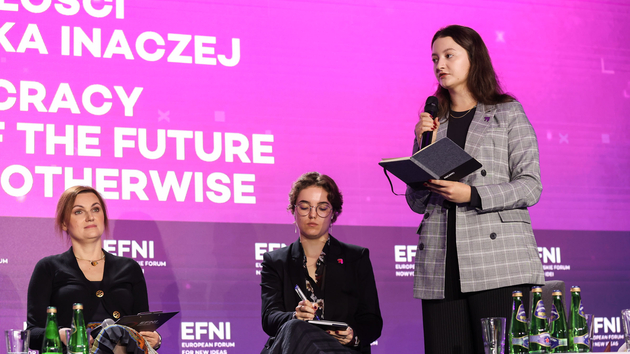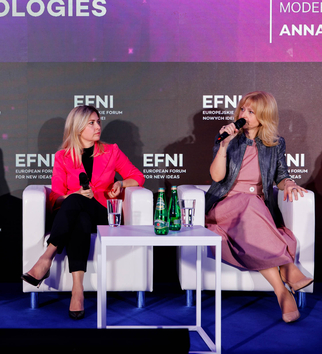Boldly reach for the important – this is our motto. University of Lodz wants to be an active participant in important debates and discussions, those big ones, with an international reach such as the European Forum for New Ideas, but also smaller ones, but equally important from a local perspective. As a socially responsible university, we want to be present wherever something important is happening and enter into an active dialogue with the business world. The fact that we are the main knowledge partner of such an impressive undertaking is the result of our conscious strategy
– emphasizes Dr hab. Agnieszka Kurczewska, Associate Professor, the University of Lodz Vice-Rector for External Relations.
Prof. Agnieszka Kurczewska paricipated in the panel "New competences or new professions?". The discussion was also attended by: Prof. Piotr Wachowiak, Małgorzata Dobies-Turulska, Joanna Pruszyńska-Witkowska and Artur Skiba.
The panel "Do we trust AI? On the development of new human-centred technologies" was a discussion at the intersection of technology and social sciences. The discussion was attended by: Dr Dominika Kaczorowska-Spychalska, Agnieszka Jankowska, Wojciech Murawski, Anna Rulkiewicz and Martyna Różycka.
Participants of the panel "Child well-being in the digital world" with the participation of Dr Ada Florentyna Pawlak, a lecturer from the Faculty of Management of the University of Lodz, drew attention to, among other things, digital hygiene and the huge role of social education. The discussion was also attended by: Magdalena Bigaj, Konrad Ciesiołkiewicz, Katarzyna Gruszecka - Spychała and Marcin Olender.
At the "New Green Cities" panel led by Dr hab. Mariusz Sokołowicz, the participants met with Bożena Leśniewska from Orange Polska, Łukasz Niewolta from the Luxmed Group, Vice mayor of Sopot Marcin Skwierawski, a writer and a reporter Paulina Wilk, Izabela Rakuć-Kochaniak from Veolia Polska and Julia H Giannini MSc from Bupa London, who in her introduction touched upon the issue of modern, green urban development.
Participants in the debate "Will robots replace us at work?" gave a closer look to the consequences of technological change for the future of employment. Dr Dominika Kaczorowska-Spychalska admitted that she believed certain regulations were necessary, e.g. in the context of copyright or advertising that use generative AI models.
"We interact with Artificial Intelligence very often, but we don't realize it" Dr Dominika Kaczorowska-Spychalska, Director of the Centre for Intelligent Technologies at the University of Lodz Faculty of Management – data alone does not give us a clear answer on how to trust or what actions to take to build this trust. In my opinion, it is important to build experiences and self-awareness of what this artificial intelligence actually is.”
The panel discussion also included: Katarzyna Gruszecka-Spychała, Jacek Męcina, Antoni Rytel and Robert Żurawski.
Globally, women make up just 25% of the tech industry. Dr Ada Florentyna Pawlak, Mikolaj Pindelski, Alicja Tatarczuk and Katarzyna Blachowicz discussed what public administration and the third sector should do to include women in the digital world in the panel entitled " Presence and role of women in the world of technology".
Two groups clashed as part of the "Oxford Debate in a Different Way": the first group defended the thesis that there would be an increase in the number of democratic states with a market economy. The opponents argued quite differently, namely that the future would bring an increase in the number of authoritarian states with a centrally planned economy. The debate with the participation of students of the SGH Warsaw School of Economics and the University of Lodz was led by the Rectors of both universities – Prof. Agnieszka Kurczewska and Prof. Piotr Wachowiak.
Each year, the Forum gathers more than a thousand participants – representatives of business, science, culture and both Polish and European administrations. The European Forum for New Ideas has been organised since 2011 by the Confederation Lewiatan in partnership with BusinessEurope and the City of Sopot.
Guests of the previous editions of EFNI included: Herman Van Rompuy – DHC of the University of Lodz, Jeffrey David Sachs – DHC of the University of Lodz, José Manuel Durão Barroso – DHC of the University of Lodz, Mikhail Gorbachev, George Friedman, Zbigniew Brzeziński, Frans Timmermans, Bernard-Henri Lévy.
Boldly reach for the important – this is our motto. University of Lodz at the European Forum for New Ideas 2023 in Sopot was an active participant in important debates and discussions. It was intense and inspiring!
Source: Centre for External Relations, University of Lodz;
Edit: Communications and PR Centre, University of Lodz








